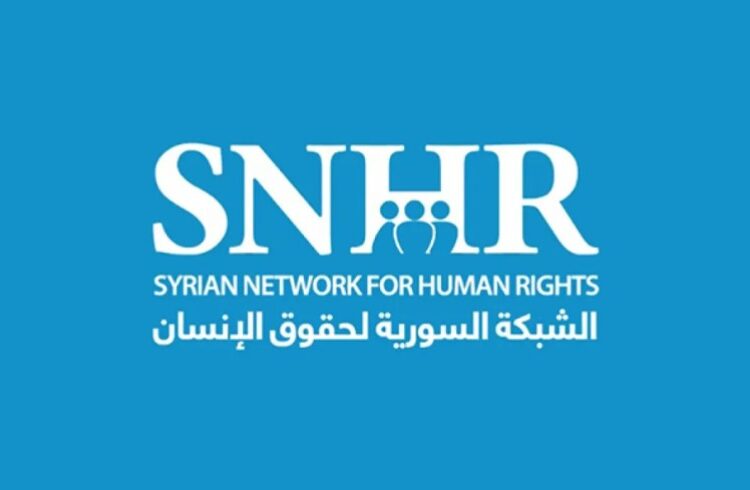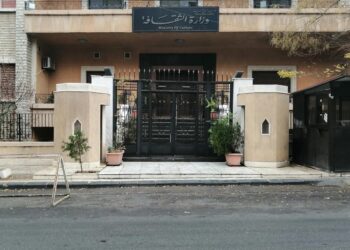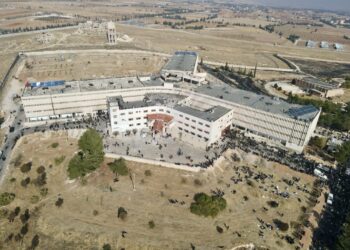Fadel Abdulghany
Every year, in June, the Syrian Network for Human Rights (SNHR) marks the anniversary of its founding and the launch of its work. This year, which marks its fourteenth anniversary, the SNHR announces the official launch of its activities in the capital, Damascus. This year, SNHR is receiving a legal license to conduct human rights work within Syria and opening its first office on Syrian soil. This follows the fall of the Bashar al-Assad regime in December 2024. This step represents a pivotal milestone in the SNHR’s journey, cementing its position as an independent national institution dedicated to defending human rights and supporting victims, within the framework of the transitional phase and rebuilding the new Syria.
The Origins and Journey of the Syrian Network for Human Rights: A Voice for Victims and an Archive for Justice
The Syrian Network for Human Rights was established in June 2011, following the outbreak of the popular uprising in March of the same year. The goal was to document daily violations committed against peaceful demonstrators, preserve national memory, and prevent the suppression of truth. Over the years, the Network’s work has evolved from initial documentation efforts to a comprehensive institutional framework based on the development of precise methodologies and the creation of specialized databases, most notably:
- Database of Victims of Extrajudicial Killing: Documented the killing of at least 234,576 civilians, including 30,559 children and 16,526 women.
- Database of Detainees and Forcibly Disappeared Persons: Documented approximately 177,000 cases of detention and enforced disappearance.
- Database of Victims of Torture: Documented the killing of at least 45,342 individuals, including 225 children and 116 women.
- Database of Attacks on Vital Facilities and Civilian Objects: Includes 39 categories of vital facilities and infrastructure. The most notable documented attacks include 919 attacks on medical facilities, 1,477 attacks on places of worship, and 1,703 attacks on schools.
- Specific databases of officials implicated in violations: Includes information on more than 16,000 officials from the security, military, and civilian agencies.
- Specialized databases on the use of internationally prohibited and indiscriminate weapons, including:
- Barrel bombs: 81,954 barrel bombs documented, resulting in human casualties and widespread destruction of infrastructure.
- Cluster munitions: 499 attacks documented, resulting in human and material damage.
- Incendiary weapons: 182 attacks documented, resulting in destruction and harm.
- Chemical weapons: 222 attacks documented, resulting in widespread humanitarian impact.
These rules are based on strict, multi-source verification standards, making them a reliable reference for high-level international bodies, such as the Office of the High Commissioner for Human Rights, the International, Impartial and Independent Mechanism (IIIM), the International Commission of Inquiry, and reports from the foreign ministries of many countries around the world, in addition to a number of European courts that adopt them in litigation processes related to war crimes and crimes against humanity.
Report Production and International Human Rights Participation
The Syrian Network for Human Rights (SNHR) has issued more than 1,469 comprehensive human rights reports and approximately 520 urgent statements, in addition to publishing more than 19,357 human rights news items, documenting daily violations and ongoing events on the ground. The Network has also actively participated in more than 110 high-level international events and contributed to international criminal accountability efforts by providing European and American courts with human rights evidence and documents in six judicial proceedings. SNHR data was officially used in the Canadian-Dutch prosecution submission to the International Court of Justice.
SNHR is an active member of international human rights alliances, such as the International Coalition for the Responsibility to Protect (ICRtoP), and has signed 33 memoranda of understanding and data exchange agreements with UN agencies, governments, research centers, and international human rights organizations, reflecting its broad influence on the international scene.
Challenges Facing the Syrian Network for Human Rights
Documenting human rights violations in Syria is among the most complex and dangerous tasks, given the extremely tense security environment, the complex nature of the conflict, and the multiple parties responsible for the violations. Over the course of fourteen years, the Network has faced major challenges, including:
- Challenges and sacrifices as a human rights organization:
- Security Threats and Targeting of the Team: Many members of the Network were subjected to security harassment, arbitrary arrest, and enforced disappearance by parties to the conflict. Three of them remain forcibly disappeared. They were also subjected to assassination attempts, shelling in their areas, and confiscation of their property.
- Field Work Inside Syria: The team continued its documentation work despite extremely dangerous security conditions, including tight surveillance and continuous shelling, making the accuracy of internal information of paramount importance.
- Cyberattacks and Hacking Attempts: The Network’s website and social media accounts were subjected to systematic attacks aimed at disrupting its activity, particularly after it documented war crimes committed by Russian forces.
- Distortion and Media Disinformation Campaigns: The Network faced organized campaigns to tarnish its reputation, leading to the Assad regime establishing an organization with the same name to confuse the public. This was in addition to accusations of treason from several parties, including ISIS and the Kurdish People’s Protection Units (YPG).
- Challenges imposed by complex reality
- Fear of Witnesses and Victims: Victims and witnesses’ fear of retaliation posed a significant obstacle to obtaining their testimonies.
- Conflicting and contradictory narratives: The complex reality in Syria necessitated the development of rigorous methodologies for verifying information.
- Restrictions on access to affected areas: Siege and fighting hindered the team’s access to many affected areas.
- A complex conflict environment: The multiplicity of parties to the conflict made it difficult to accurately determine responsibilities.
- Frustration resulting from impunity: The continued lack of accountability impacted victims’ responses and the progress of documentation processes.
- Chronic psychological exhaustion for the team: The team suffered from persistent psychological stress due to constant exposure to victims’ testimonies and images of violations.
Despite these challenges, SNHR has remained committed to professional and ethical standards, affirming that protecting the truth and providing justice for victims is a legal, moral, and humanitarian obligation.
The Syrian Network for Human Rights’ vision of human rights work
- Vision since its founding:
Since its launch in 2011, the Syrian Network for Human Rights’ vision has been based on supporting the Syrian people’s demands for freedom, dignity, and justice, and confronting the violations of the Assad regime and all other parties to the conflict. This vision has been built on clear objectives, including:
- Document violations accurately and systematically.
- Identify those responsible and ensure they do not go unpunished.
- Preserve national memory and consolidate the narratives of victims and survivors.
SNHR has undertaken coordinated legal and media efforts to place those involved on international sanctions lists and prevent their rehabilitation, thus contributing to the consolidation of a culture of accountability at the local and international levels. The Network has also adopted a victim-centered human rights approach, as they are the bearers of rights and whose voices must be heard, not merely as statistics. This approach is embodied in the Network’s identity, as survivors and family members of victims constitute the vast majority of its team, having directly experienced the conflict.
- Vision for the Transitional Phase:
The transitional phase in Syria represents a pivotal turning point in rebuilding the political system on foundations that guarantee pluralism and broad popular participation, and protect the rights of all components of Syrian society.
After fourteen years of continuous human rights work, the Syrian Network for Human Rights has developed a comprehensive vision for transitional justice, based on the principles of international human rights law and responding to the aspirations of Syrians for fairness, accountability, and institutional reform. These pillars are an essential foundation for building a sustainable future based on human rights and the rule of law, and include:
- Justice and Accountability: A firm belief that accountability is a fundamental condition for achieving justice, and a full readiness to provide comprehensive databases on those implicated in violations.
- Uncovering the fate of missing persons: An unwavering national priority, along with enhanced cooperation with the UN Independent Commission on Missing Persons in Syria.
- Monitoring the performance of transitional authorities: To ensure implementation of the legal obligations stipulated in the Constitutional Declaration and human rights treaties.
- Institutional Reform: Effectively contributing to the reform of state institutions, particularly security and judicial institutions, and transforming them into tools for the protection of human rights.
- Contributing to political and constitutional processes: by advocating for the inclusion of transitional justice principles in the new Syrian constitution.
- Documenting individual violations and strengthening citizen voices: by highlighting each victim as an individual with a right and a status, not just a number on a record of violations.
Renewed Commitment and Deserved Gratitude
As Syria enters a critical phase following the fall of the Assad regime, the Syrian Network for Human Rights renews its commitment to continuing its role by: continuing field documentation, issuing legal and human rights reports and analyses, supporting training and capacity-building programs, providing institutional support, strengthening cooperation with local partners, and intensifying advocacy efforts at the local and international levels.
SNHR extends its deepest gratitude and appreciation to all who supported its journey, especially the victims and their families, survivors, eyewitnesses, volunteers, local activists, supporters, and all team members who faced grave dangers that often threatened their lives. It also remembers with all loyalty its dear colleagues, team members, and volunteers, whom it lost during its journey to defend the truth, pledging to continue on the path until accountability is achieved and Syria becomes a free, democratic, just, and dignified homeland for all its citizens.






